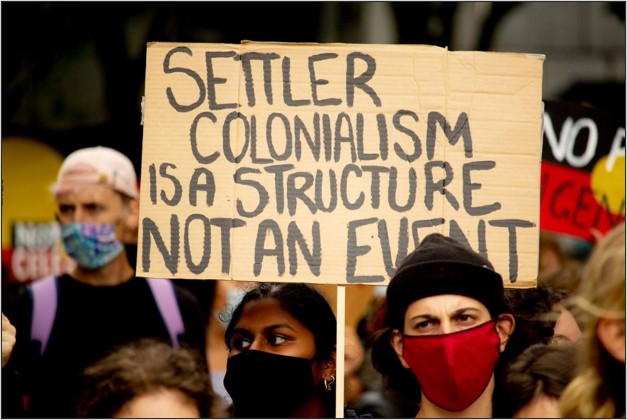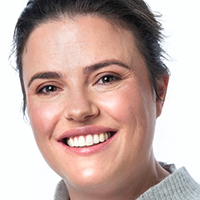The Australian Centre
The Australian Centre fosters world-leading research on the settler state, its culture, institutions, sovereignty and identities across several different disciplines, including history, sociology, literature, politics, visual arts and anthropology.

About The Australian Centre
The Australian Centre aims to foster a critical examination of Australian society, culture and history, with an interdisciplinary focus on settler colonialism and its institutions.
The Centre offers a rich program of research and activity. Our program is shaped by a series of provocations that consider how Australia’s founding as a settler colony informs our capacity to engage with the central challenges of our time.
An important part of our work is the education we provide to individuals and organisations in preparing for treaty negotiations.
Our people
Explore what we do
The Centre offers a rich program of research and activity that includes research, events and critical conversations, education program and partnerships and projects and work closely with industry, government, NGOs, and community organisations.
-
Critical public conversations
The Australian Centre's hugely popular Critical Public Conversations (CPC) series is the Centre's flagship public event offering.
Learn more -
Graduate research
Our programsThe Australian Centre supports graduate research work in Indigenous settler relations.
-
Treaty education
The Australian Centre's Treaty Education explores how treaties function in relations between Indigenous peoples and contemporary settler societies.
View our courses -
Research
Our objective is to elevate the expertise and influence of the University of Melbourne researchers through research, research training, specialised graduate education and meaningful critical public discourse.
Find out more
News and events from The Australian Centre
Engage our services
The Australian Centre is always open to developing new research partnerships and projects and works closely with industry, government, NGOs, and community organisations. If you are interested in working with us, please email us with your name, affiliation and a brief description of your work.
Acknowledgement of Country
The Australian Centre is located at the University of Melbourne, Parkville campus, on unceded Wurundjeri Woi-Wurrung land. We acknowledge Country and the people belonging to Country, the Wurundjeri Woi-Wurrung Traditional Owners, and we value our continuing relationship with you and your on-going care for Country. We thank the Wurundjeri Woi-Wurrung Cultural Heritage Corporation for your generous and ongoing contributions to the Australian Centre.
We also acknowledge that the University of Melbourne has campuses on Country of other First Nation groups, and we acknowledge the Traditional Owners of the Parkville, Southbank, Werribee and Burnley campuses, the Wurundjeri Woi Wurrung and Bunurong/Boon Wurrung peoples; the Yorta Yorta Nations, whose Country the Shepparton and Dookie campuses are located, and the Dja Dja Wurrung Nations, Melbourne University’s Creswick campus location.
The Australia Centre acknowledges all Aboriginal and Torres Strait Islander people and First Nations peoples whose work, lives and Country intersect with ours. We acknowledge that invasion and colonisation has caused harm that is on-going to First Peoples.
The Centre, its Fellows and Affiliated Researchers are focused on scholarship that turns a critical lens to the settler colonial state and its institutions. Working always in engagement with Indigenous scholars and scholarship, and in service of Indigenous sovereignties, our research considers how Australia’s founding as a settler colony restricts our capacity to engage with the central challenges of our time. Our interdisciplinary work centres critical scholarship that is often marginalised in the disciplines. We aim to create an institutional home for the slow and careful approaches foundational to the often undervalued or invisible ethical work that is essential to any research in this field.
Critical public conversations
The Australian Centre's hugely popular Critical Public Conversations (CPC) series is the Centre's flagship public event offering.
The Critical Public Conversation (CPC) series aims to enrich the university's social, cultural, and intellectual life and beyond by facilitating conversations that explore the challenges at the heart of relations between Indigenous and settler peoples in a respectful and considerate manner. By making explicit the fraught foundations of this relationship and its centrality to the politics of this continent, the series develops capacity for scholarship that is more ethical and academically rigorous.

Supporting emerging research
The Australian Centre seeks to catalyse, incubate, and support research in Indigenous-settler relations through two key programs.
-
Seed Funding Program
Through this program the Centre aims to create an institutional home for the slow and careful approaches foundational to the often undervalued or invisible ethical work that is essential to any research in this field.
-
Visiting Fellowship Program
The Visiting Fellowship Program brings early and mid-career researchers to the Australian Centre to collaborate on innovative research with a particular focus on advancing the study of Indigenous-settler relations.

Springer book series
The series Indigenous-Settler Relations in Australia and the World brings together scholars interested in examining contemporary Indigenous affairs through questions of relationality. This is a unique approach that represents a deliberate move away from both settler-colonial studies, which examines historical and present impacts of settler states upon Indigenous peoples, and from postcolonial and decolonial scholarship, which is predominantly interested in how Indigenous peoples speak back to the settler state. Closely connected to, but with meaningful contrast to these approaches, the Indigenous-Settler Relations series focuses sharply upon questions about what informs, shapes and gives social, legal and political life to relations between Indigenous peoples and non-Indigenous peoples, both in Australia and globally.
Series Editors: Sarah Maddison, Sana Nakata, Julia Hurst
Publications
View a selection of books, book chapters and journal articles published by academics associated with the Australian Centre.
Reading group
The Australian Centre runs a critical reading group each semester based on an academic text. Our monthly meetings bring together graduate researchers, early career researchers and senior academics across myriad disciplines to discuss the chosen text, generating new ideas and relationships. If you are interested in joining the Australian Centre reading group, please email us a few brief sentences about yourself and your research.

Local Collaborations
View recordings of past events hosted in collaboration with our Australian-based partners, scholars, and networks.
International collaborations
View recordings of past events hosted in collaboration with international partners, scholars, and networks.
-
Indigenous Women Futuring
-
Recoding relationally: Indigenous new media and digital storytelling
-
Root and Branch: Essays on Inheritance
-
Reflections on Indigenous Politics and Settler Colonialism in Aotearoa
-
Refusal, Resurgence, Renewal: Indigenous Independence in the 21st Century
-
Visiting Fellows Seminar (Semester One)
The Australian Centre's hugely popular Critical Public Conversations (CPC) series is the Centre's flagship public event offering.
The Critical Public Conversation (CPC) series aims to enrich the university's social, cultural, and intellectual life and beyond by facilitating conversations that explore the challenges at the heart of relations between Indigenous and settler peoples in a respectful and considerate manner. By making explicit the fraught foundations of this relationship and its centrality to the politics of this continent, the series develops capacity for scholarship that is more ethical and academically rigorous.
Each year the presentations are organised around a central theme. Previous themes include:
- Introducing Critical Public Conversations - Semester one 2020
- What does success in Indigenous Higher education look like? - Semester two 2020
- Exploring Indigenous Settler Relations - 2021
- Undoing Australia - 2022
- Country, Climate, Colonialism - 2023

Sovereignty and Solidarity: Redefining belonging in so-called Australia
In 2024, the Australian Centre’s Critical Public Conversations series will explore questions of belonging, borders, and place. We investigate how Australia’s founding as a settler colony constrains capacities to welcome refugees to these shores and highlight moments of transnational solidarity - such as the issuing of Aboriginal passports to asylum seekers - that circumvent settler hegemony as evidence of “enduring Indigeneity” (Kauanui, 2016). We draw on Indigenous theorists and activists as well as voices from various racialised, non-white, or non-Anglo migrants and groups in conversation with Indigenous communities and perspectives, to reveal something specific and nuanced about the dynamic and adaptive morphology of settler colonialism as a global project (Piperoglou & Simic, 2022).
We will platform work that counters settler colonialism’s paranoid insistence on binaries, boundaries, and borders, to uncover them as arbitrary and violent technologies of state power. By examining both the spatial politics of settler colonialism and the “geopolitics of Aboriginal sovereignty” (Pugliese, 2015), this series intends to go beyond settler borders and explore the ways more humane international, domestic, and indeed interpersonal relations are bound to justice for First Nations.
Upcoming Critical Public Conversations Webinars
Previous Critical Public Conversations
Engage with recordings from previous Critical Public Conversation webinars.
-
Sovereignty and Solidarity: Redefining belonging in so-called Australia (2024)
-
Country, Climate, Colonialism (2023)
-
Undoing Australia (2022)
-
Exploring Indigenous Settler Relations (2021)
-
What Does Success in Indigenous Higher Education Look Like? (2020)
-
Introducing Critical Public Conversations (2020)
Understand the opportunities and challenges of treaty for transforming relations between First Nations and settler societies
The Australian Centre's Treaty Education explores how treaties function in relations between Indigenous peoples and contemporary settler societies. You will learn to analyse how treaties have shaped past interactions and to understand the possibilities they open for future relations. Key to this is understanding the concept of contested sovereignty as foundational to the contemporary state. These analytical skills are crucial to developing successful treaties and lawful relations with Indigenous people.
Melbourne MicroCert Series
Gain the skills, knowledge and understanding to begin meaningful treaty negotiations
-
Understanding Treaty
Gain a deeper understanding of treaty and agreement-making between Indigenous peoples and settler states
-
Indigenous and Other Sovereignties
Extend your understanding of Indigenous sovereignty and explore how it can shape treaty negotiations
-
Lawful Relations with Indigenous Peoples
Gain a deeper understanding of the international legal frameworks pivotal to treaty negotiations between Indigenous peoples and settler states
-
Recognition, Reconciliation, Refusal
Analyse Indigenous practices of recognition, reconciliation, and refusal as they relate to treaty-making
Add Indigenous Governance Principles to this series of Melbourne MicroCerts and you will complete Australia’s first Professional Certificate in Treaty
Donate to support First Nations’ access to this MicroCert series
Individuals and organisations are invited to contribute to the Treaty Education Scholarship Fund. Your investment will help more Indigenous people access these MicroCert series who might otherwise be unable to participate.
The Australian Centre supports graduate research work in Indigenous settler relations
Interdisciplinary Graduate Research Program in Indigenous Settler Relations
The Interdisciplinary Graduate Research Program in Indigenous Settler Relations is open to graduate researchers in any faculty undertaking graduate research related to the emerging field of Indigenous settler relations in Australia and the world. The program enriches the graduate research experience by creating a strong cohort and intellectual community that assists students in developing their post-degree pathways.
The program connects students with researchers across disciplines, fostering an engaged and supportive intellectual community, and creating a strong cohort experience for the duration of their study. The program deepens academic understandings, and enhances interdisciplinary knowledge exchange on research that leads to more just relations between Indigenous and settler peoples. Students are supported to build networks across the University and with relevant external organisations and to develop their research in reference to current real-world challenges.
Activities throughout the year include exclusive masterclasses, a research symposium, writing retreats, and a reading group, as well as access to the suite of public seminars, lectures and film screenings run by the Australian Centre. Opportunities are available to meet regularly throughout each semester to share research progress and to participate in writing sessions, critical reading groups and workshops focused on ethics, research methodology and approaches for communicating research to diverse audiences across and beyond the academy.
Applications to join the program are called for twice a year, with start year intake applications closing in early February and mid-year entry closing in late June. Students can join the program at any time during their candidature and remain part of the program until the completion of their studies. Timely completion of the thesis remains the priority, with the program intended to enhance the experience of advanced research training and aid graduation pathways.
Reading Group
The Australian Centre runs a critical reading group each semester based on an academic text. Our monthly meetings bring together graduate researchers, early career researchers and senior academics across myriad disciplines to discuss the chosen text, generating new ideas and relationships. If you are interested in joining the Australian Centre reading group, please email us a few brief sentences about yourself and your research.
2023 Reading Group
The 2023 Reading Group will cover the following texts:
- Semester 1, 2023 - Pollution Is Colonialism, Max Liboiron.
- Semester 2, 2023 - Public Policy and Indigenous Futures, eds. Nikki Moodie and Sarah Maddison
Our reading group is conducted via Zoom and not face-to-face
The 2022 Reading Group covered the following materials:
- Semester 1, 2022 - Indigenous Futures and Learnings Taking Place, eds. Ligia (Licho) López López and Gioconda Coello
- Semester 2, 2022 - Settler Memory: The Disavowal of Indigeneity and the Politics of Race in the United States, Kevin Bruyneel
Previous Reading Groups hosted by the Indigenous Settler Relations Collaboration
- 2021 – Routledge Handbook of Critical Indigenous Studies, eds. Brendan Hokowhitu, Aileen Moreton-Robinson, Linda Tuhiwai-Smith, Chris Andersen, Steve Larkin
- Semester 2, 2020 – Red Skin, White Masks: Rejecting the Colonial Politics of Recognition, Glen Coulthard
- Winter 2020 – So white. So what, Alison Whittaker and Decolonisation is Not a Metaphor, Eve Tuck and K. Wayne Yang
- Semester 1, 2020 – Questioning Indigenous-Settler Relations: Interdisciplinary Perspectives, eds. Sarah Maddison and Sana Nakata
- Semester 2, 2019 – Indigenous and Decolonising Studies in Education: Mapping the Long View, eds. Linda Tuhiwai Smith, Eve Tuck and Wayne Yang
- Semester 1 2019 – As We Have Always Done: Indigenous Freedom Through Radical Resistance, Leanne Betasamosake Simpson
Graduate Researcher Support
The team would love to hear from current or prospective graduate research students undertaking study related to the emerging field of Indigenous settler relations. The team can assist with:
- Identifying potential supervisors
- Support with application processes
- Engaged research support for existing PhD and Masters by Research students
- Networking opportunities with Fellows and affiliated researchers
Students at all levels are welcome to subscribe to the Australian Centre mailing list to hear of other opportunities to get involved.


